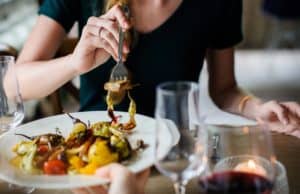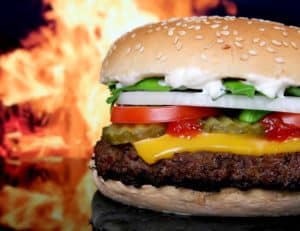 Gallstone formation is not caused by the food you eat. However, if you already have gallstones, eating certain foods may cause your gallstones to act up. A fatty meal, for instance, can cause a bout of intense pain in the abdominal area.
Gallstone formation is not caused by the food you eat. However, if you already have gallstones, eating certain foods may cause your gallstones to act up. A fatty meal, for instance, can cause a bout of intense pain in the abdominal area.
The pain can also shoot in the back, in the shoulders, or between the shoulder blades. This is called a gallstone attack or biliary colic.
When you have gallstones, foods to avoid include those high in fats.
A lot of people suffer from a gallstone condition yet know very little about it. It’s about time to change that, so let’s start talking about some important gallstone facts.
80% of gallstone cases don’t cause any symptoms
You may indeed develop gallstones yet not know about it. These are often referred to as the silent gallstones. It’s fairly common for this condition to remain without symptoms for 10-20 years. Most doctors agree that gallstones that don’t bother you don’t need any treatment. It’s likely though that as you age, symptoms will start to show.
High-fat foods will trigger the painful symptoms
Fatty foods that reach the duodenum stimulate the gallbladder to contract and release bile. In fact, a very fatty meal will trigger the gallbladder to empty its stored bile. This contraction then causes the “silent stones” to be displaced. The stones can move and get caught in the neck of the gallbladder or along the bile duct. As bile flows, it forces the stones through the narrow neck or channel and this can be very painful.
Your list of gallstones foods to avoid will include:
 Fatty meat cuts and processed meat like sausages and bacon. Veer away from fried and greasy foods that you see in most fast-food chain menus.
Fatty meat cuts and processed meat like sausages and bacon. Veer away from fried and greasy foods that you see in most fast-food chain menus.
Whole milk and full-fat dairy products are on this list, too.
Gallstones can lead to complications
Biliary colic is not the only problem with gallstones. When the normal flow of bile out of the gallbladder is blocked by gallstones, this causes the liquid to back up. Bacteria may set in because of the failure to drain bile properly. The gallbladder can then become infected and inflamed. This condition is called cholecystitis.
Another complication is called cholangitis which involves the bile ducts. It starts with gallstones that are stuck in the long, narrow channel. This infects the bile duct and may even affect the liver.
Pancreatitis and other forms of infection may also result from symptomatic gallstones if left untreated for a long time.
Aside from fats, there are other foods you should avoid?
Once your gallstones start causing pain, seek medical attention right away. You may also want to know which foods help to prevent gallbladder and bile duct inflammation. It will do you good to wean your body from inflammatory foods.
Avoid products that are highly-processed and are high in sugar, salt, or refined carbs.
To some people with gallstones, red chili pepper or other spicy food causes them gallstone pain.
It’s not only what you eat, but also how large your meal is!
Eat frequent, smaller meals instead of one or two huge meals. This will be easier on your digestive system and causes less stress to your diseased gallbladder.
This eating pattern makes it less likely for gallstones to occur. Frequent meals mean a frequent release of bile. When the bile does not sit too long in the gallbladder, there’s less chance for it to supersaturate and become stones.
Eat high-fiber foods for a healthier gallbladder
Eat foods high in fiber, such as whole grains, fruits, and vegetables, to prevent the recurrence of your first gallstone attack. Some of these are beans, peas, artichokes, broccoli, raspberries, flaxseeds, and oatmeal.
Should you take food with fats, limit your intake to low-fat or fat-free options. Choose your protein sources carefully. Prefer chicken and fish over red meat, and trim fat and chicken skin off. Balance your diet with healthier fat food sources, too, including avocado, nuts, chia seeds, and olive oil.
Can diet cure or get rid of gallstones?
It’s a fact that diet cannot cure or get rid of gallstones.
Managing your gallstone condition, though, becomes easier with this basic food guide.
If you have gallstones planning out your meals around which foods to eat and which foods to avoid will ease the pain. It may also help to prevent complications. Best of all, these food choices are not only good for the gallbladder. They’re also good for the heart and your overall health.